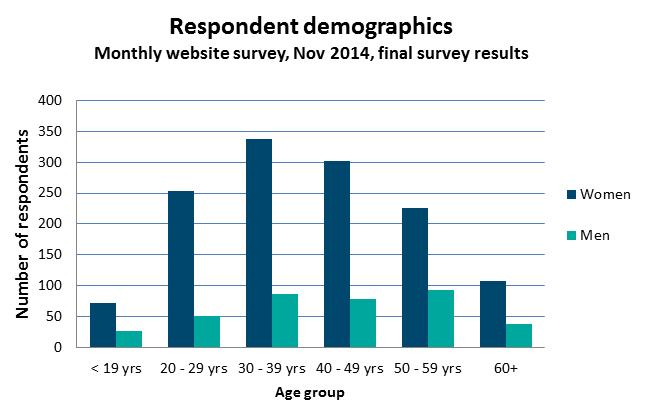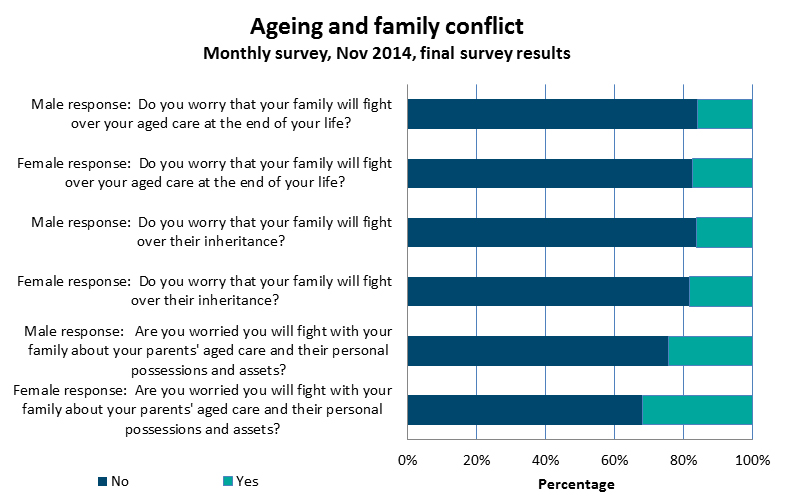In November 2014, Relationships Australia asked visitors to our website to participate in a two minute survey that asked them whether they were concerned about ageing related family conflict.
Previous research finds that…
There is a range of age-related transition points that may lead to family relationship problems.
These include when there is a need to:
- Make major financial decisions, including retirement and estate planning;
- hand over the family business or family farm;
- make end of life decisions, including transition to an aged care facility;
- consider health and safety considerations such as driving, health care, safety, abuse and neglect;
- consider care for caregivers and caregiver burden; and
- make decisions around relationship concerns and religious issues.
The breakdown of family relationships can increase the risk of family disputes while parents are living, and can also increase the risk of inheritance disputes after parents have died. How children navigate through these issues may also affect connections and family relationships into the future.
While many families can successfully navigate life-course decisions, at certain points relationship problems are more like to appear or escalate. Where there is a history of poor childhood relationships, and/or challenged problem solving and communication skills, it can be difficult to resolve family conflict. Families often have to participate in decision-making in areas where they have little experience or they have exhausted their usual coping strategies and are unable to make these decisions. Stress may lead to resurfacing of childhood sibling rivalry and past unresolved conflict. In addition, adult siblings may go about developing solutions differently from their siblings, and without consultation with parents or other family members. There may also be resentment by an adult child who is doing the most primary care.
If parents have insufficient funds to pay for needed aged care services, there may be conflict over who should pay, especially when some family members are in better financial circumstances than others. Some adult children may also care more about the inheritance than their parents. This can lead to siblings accusing other siblings of stealing money, abusing their parent, or mishandling assets. Disputes may also arise over inheritances after the death of parents, but also when parents sell the family home and money is transferred to adult children. Where a parent has married for a second or third time or has co-habited with a new partner for some time, there may be distrust or dislike between adult children and the step-parent and/or step-siblings.
Some parents may not cope with adult children making major life decisions in respect of their housing, health or finances. In situations of heightened emotions, parents may see these decisions as loss of their autonomy or as their children trying to put them away. Where there are health concerns or diminished capacity, there may be involvement of public advocates, health practitioners or other services, and there may be disputes that involve, or require the services of, particular professionals.
Survey results
Just under 1,700 people responded to Relationships Australia’s online survey in November, 2014.
Similar to October’s survey, almost 80 per cent of survey respondents identified as female, with women outnumbering men in every age group (see figure below). Around 85 per cent of survey respondents were aged between 20-59 years, with the peak response category capturing the views of women aged from 30 to 39 years. When compared to last month, a slightly higher proportion of people aged over 60 years answered the survey (9% compared with 6%), possibly relating to the greater appeal of the survey topic to older people.
The demographic profile of survey respondents remains consistent with our expectations of the groups of people that would be accessing the Relationships Australia website.


A significant minority of male and female survey respondents (men 15%, women 16%) indicated they were worried their family would fight over their aged care. Men and women also reported similarly when asked if they were worried that their family would fight over their inheritance (men 16%, women 18%).
When asked about their concerns regarding family conflict around their parents’ ageing, women were more likely to report that they were worried their family would fight about their parents’ aged care, personal possessions and assets. Almost one in three female and one in four male respondents voiced these concerns in Relationships Australia’s monthly survey (see figure above).
Resources
If you feel anxious, stressed, have a diagnosed mental illness or have suicidal thoughts, or you want to support someone in this situation, there are many organisations in Australia who offer support, information, self-help programs and referrals to health professionals.
In a crisis you can contact the following organisations 24/7
Lifeline
13 11 14 www.lifeline.org.au
Lifeline offers free telephone support 24 hours a day, but also offers self-help tool kits and a wide range of information on topics, including, financial stress, panic attacks and family and relationship problems.
SANE
1800 18 SANE (1800 18 7263) www.sane.org
In addition to 24 hour telephone support, SANE offers online forums for people living with mental illness and their families and carers. SANE also combats the stigma associated with mental illness.
Kids Helpline
1800 55 1800 www.kidshelp.com.au
Kids Helpline offer free 24 hour telephone and online support to children and young people aged 5-25. It also provides online information and activities.
Beyondblue
1300 22 4636 www.beyondblue.org.au
Beyond blue offers 24 hour telephone support as well as information about anxiety, depression and suicide for all people of all ages.
Suicide Callback Service
1300 659 467 www.suicidecallbackservice.org.au
The Suicide Callback Services offers free telephone and online support as well as information and resources to anyone affected by suicide – people with suicidal thoughts, people worried about someone else, people who have lost someone to suicide and health professionals.
Mensline Australia
1300 789 978 www.mensline.org.au
Mensline offers telephone and online support, information and referral service helping men to deal with relationship issues.
Other organisations that offer support:
Black Dog Institute
www.backdoginstitute.org.au – Information on symptoms, treatment and prevention of depression and be-polar disorder.
Carers Australia
1800 242 636 – Short-term counselling and emotional and psychological support services for carers and their families.
Headspace
1800 650 890 www.headspace.org.au – Free online telephone service that supports young people 12-25 going through a tough time and their families.
Head to Health
www.headtohealth.gov.au, Find online mental health resources.
Mood GYM
www.moodgym.anu.edu.au – A free, confidential online self-help program to assist people with depression, based on cognitive behaviour therapy. Mood GYM was developed at the Australian National University National Institute for Mental Health Research. First launched in 2001, the program has been revised and now has more than 800,000 registered users across the world, and is available in English, Chinese, Dutch, Finnish and Norwegian. There are five modules and completion of at least two modules is linked to significant improvements. See also e-couch, Blue Board and Beacon.
References
Bagshaw, D., Zannettino, L., Wendt, S. and Adams, V., (2012). Preventing the financial abuse of older people by a family member. Designing and evaluation older-person-centred models of family mediation. Final report. University of SA.
Elder 2014 World Summit & Symposium on Mediation with Age Related Issues, Canada. The Summit program and presentations are available at http://www.eldermediation.ca/page11/files/Summit%20Program%20Halifax%202014.pdf.
Greene, R. & Riley, J. (2006). Family and group interventions and book of social work in health and aging. In B. Berkman & S. D’Ambruoso (Eds.), (pp.757–764). New York, NY: Oxford University Press.
King, C., Wainer, J., Lowndes, G., Darzins, P. and Owada, K. (2011), For love or money (intergenerational management of older Victorians’ asset: Protecting Elders Assets), Melbourne : Eastern Health Clinical School, Monash University.
World Health Organization. (2013). Mental health and older adults, Fact sheet no. 381. Accessed at http://www.who.int/mediacentre/factsheets/fs381/en/ on 10/11/2014.
